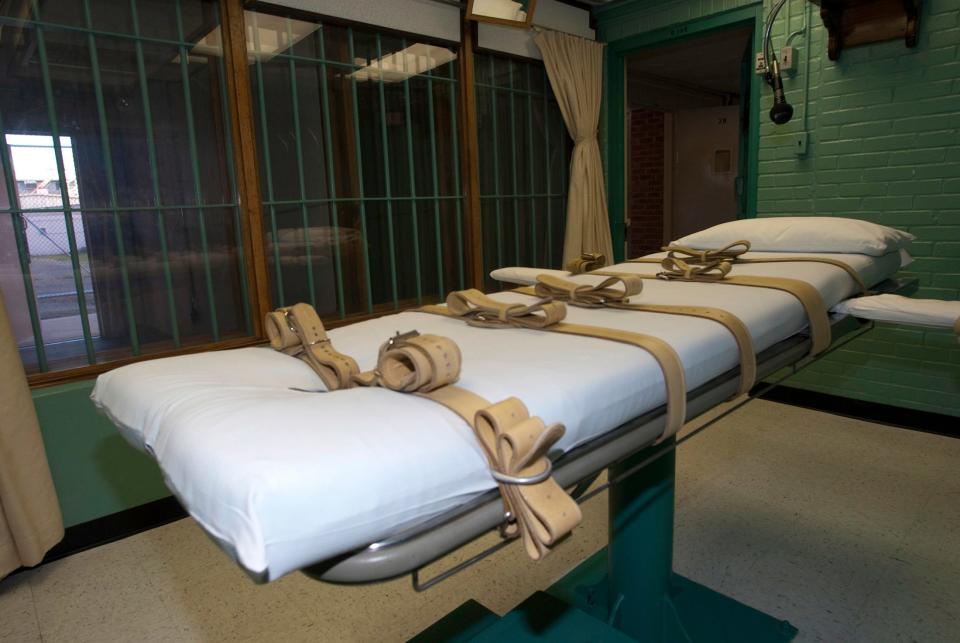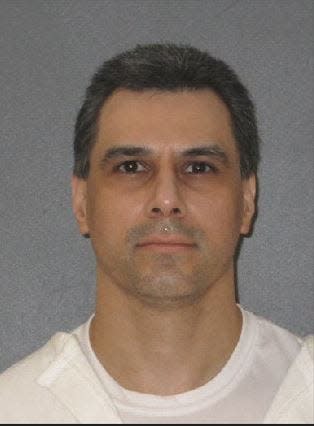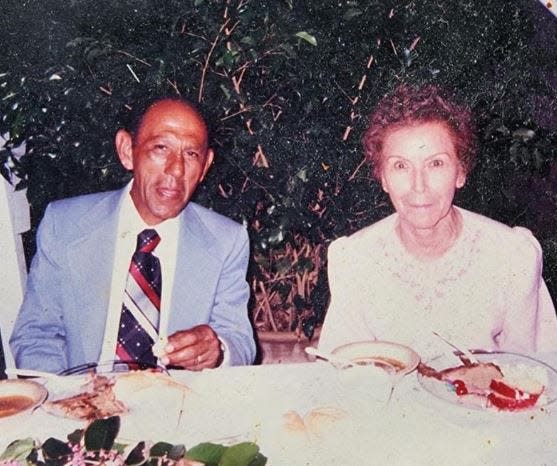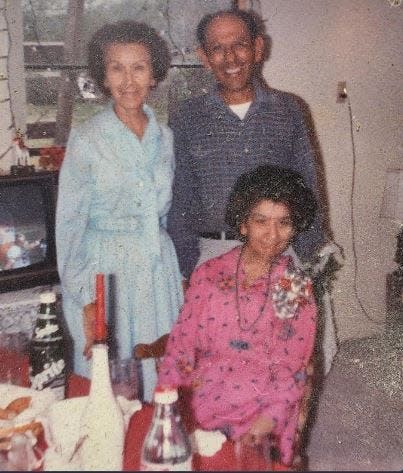Texas set to execute Ruben Gutierrez in retired teacher's death on Tuesday. What to know.
Texas is set to execute its third death row inmate this year on Tuesday, just two days before Alabama is set to put a man to death. By week's end, the country will have executed 11 death row inmates.
Texas inmate Ruben Gutierrez, 47, is scheduled to die by lethal injection sometime after 6 p.m. CT for the 1998 beating death of 85-year-old Escolastica Harrison, a retired schoolteacher who enjoyed gardening and looking out for migrant families living in the south Texas border city of Brownsville.
Though Gutierrez acknowledges planning to rob Gutierrez with the help of two other men, he maintains that he never expected the night to turn violent and was outside while Harrison was killed.
For Harrison's family, the execution equals justice, though it comes more than 25 years after Harrison was murdered.
Here's what you need to know about the case, Gutierrez and the execution.

Who is Ruben Gutierrez?
Gutierrez is a native of Fort Myers, Florida who moved to Brownsville with his parents and older brother when he was about 8 years old.
He married at the age of 17 when his girlfriend became pregnant, and the couple had two children when Gutierrez was arrested at the age of 21 following Harrison's murder. He's been on death row nearly their entire lives.
"When he was convicted, he told his wife to move on with her life because of his death sentence," according to a report written by Diane Mosnik, a clinical neuropsychologist who evaluated Gutierrez in 2019. "(Gutierrez) explained to this examiner that he didn't want to interfere in his children's lives as he was in prison and they had their own lives to live."
His defense attorneys have argued that his alcoholic father's abuse of Gutierrez, his mother and his brother is a mitigating factor in his crimes and should have helped spare him from the death penalty.

What crime was Gutierrez convicted of?
Gutierrez was convicted in the 1998 beating death of 85-year-old Escolastica Harrison, who was targeted because she didn't trust banks and reportedly had $600,000 in cash in her home, according to court records.
Harrison had been living with her nephew, Avel Cuellar, in 1998. Gutierrez was a friend of Cuellar's and was frequently at Harrison's home socializing and drinking, eventually befriending the 85-year-old and running errands for her, which allowed him to learn about the cash she kept in her home and craft a plan to steal it, according to court records.
On Sept. 5, 1998, Gutierrez and two other men ? Rene and Pedro Garcia ? went to Harrison's home to rob her. The accounts of what happened in her home vary, with Gutierrez arguing that he waited outside and had no idea things would get violent.
Harrison ended up “face down in a pool of blood” after having been beaten and stabbed 13 times with two screwdrivers, court records say. She had defensive wounds that showed she fought for her life and died from "massive blows to the left side of her face," a medical examiner testified at trial.
Though Gutierrez thought Harrison had $600,000 in the home, it's unclear how much money the men made away with but prosecutors say it was at least $56,000.
A jury found Gutierrez guilty of capital murder in 1999 and sentenced him to death one month later.
Who was Escolastica Harrison?
Escolastica Harrison's nephew told USA TODAY in an interview that his aunt was a caring woman and pillar of her community.
As a third-grade teacher at a poor elementary school filled with the children of migrants, Harrison worked hard to make sure her students learned proper English to set them up for success, her nephew, Alex Hernandez said.
When she wasn't teaching or tending to her plants, she was running a trailer park where she was more than just a landlord, he said.
Harrison cared about her tenants, offering advice, fixing things and occasionally offering diapers to help families in need, Hernandez said. “All of her tenants loved her,” even if she did have scold them every once in a while," he said.
At home, she made summers so much fun for Hernandez and his younger brother.
“She was like, ‘When we get home … you wanna go fishing?’ She had a resaca, you know, a pond in the back," he said. "She’d tell me, ‘Go fishing. I’m going to call your cousin Robbie and we’re going to make sandwiches. Y’all are going to have fun and play out there.’ That's the kind of person she was."

What has life been like for Gutierrez?
Gutierrez's execution has previously been set six times and then postponed over mostly clerical errors ? a process that amounts to torture, his attorney argues in a petition for clemency that the Texas Board of Pardons and Paroles denied on Friday.
Throughout those seven death warrants since 2018, Gutierrez has spent “more than 575 days on death watch.
“Although Mr. Gutierrez relies primarily on his faith in God to cope with this stress, he has reported having a particularly difficult time coping and maintaining his faith and hope because of the emotional ups and downs he has experienced as a result of the numerous changes in his execution warrants,” according to the clemency petition.
What has Gutierrez argued about his death sentence?
Gutierrez's defense attorneys have argued that DNA testing would prove he wasn't inside Harrison's home when she was killed. All their efforts for the testing have been denied.
Gutierrez also argues that a number of other issues make his death penalty unjust, including a lack of evidence, undisclosed evidence by prosecutors, jury misconduct, attorney failure, and coerced confessions, among others according to court documents.
On top of that, authorities failed to properly investigating a “main alternative suspect,” who knew the victim personally, had just as much access to Harrison, and provided inconsistent statements to authorities, Gutierrez argues.
Cameron County District Attorney Luis Saenz refutes Gutierrez's claims, telling USA TODAY last week that his efforts are merely a “delay tactic.”
"Justice delayed is justice denied," he said. "I think the public is just frustrated with how long it takes for justice to be served. For Mrs. Harrison and for any victim in these situations."
In court records, his office has argued that Gutierrez's arguments about DNA testing amounted to an "abusive delay."
“Gutierrez purposefully forewent DNA testing at his trial in 1999, and he has leveraged that strategic decision for the last 20 years to delay enforcement of his sentence," prosecutors wrote this month.
When and where will Gutierrez be executed?
Gutierrez is set to be executed by lethal injection sometime after 6 p.m. CT at a state prison in Huntsville, about 70 miles north of Houston.
What will Gutierrez's last meal be?
Unlike the vast majority of states with the death penalty, Gutierrez has a limited choice when it comes to his last meal.
Gutierrez will choose from a menu available to all inmates in the Huntsville Unit since Texas no longer accommodates last meal requests from condemned inmates, Texas Department of Criminal Justice spokesperson Hannah Haney previously told USA TODAY.
Who will witness the execution?
It's unclear who will be in the execution chamber but typically a handful of news media members, an inmate's defense attorney, a representative from the state attorney general's office and victim family members attend.
Harrison's nephew, Hernandez, plans to witness the moment Gutierrez is put to death to fulfill a promise he made on his mother’s deathbed.
“I remember on her deathbed, like the day before she died," he said. "(She told) me to make sure he gets executed."

When is the nation's next execution?
Gutierrez will be the 10th inmate executed in the nation if his execution proceeds as planned Tuesday.
The nation's 11th execution is set for Thursday in Alabama, when that state is scheduled to execute Keith Edmund Gavin in Alabama for the 1998 killing of William Clayton Jr., a driver for a courier company.
This article originally appeared on USA TODAY: What to know about Texas execution of Ruben Gutierrez on Tuesday
